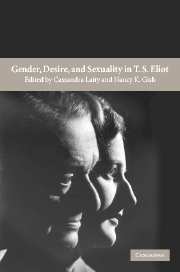
- Cited by 10
-
Cited byCrossref Citations
This Book has been cited by the following publications. This list is generated based on data provided by Crossref.
2006. The Art of Twentieth‐Century American Poetry. p. 234.
Pondrom, Cyrena 2009. A Companion to T. S. Eliot. p. 323.
Query, Patrick 2009. A Companion to T. S. Eliot. p. 350.
Perl, Jeffrey M. 2009. A Companion to T. S. Eliot. p. 133.
Linehan, Thomas 2012. Modernism and British Socialism. p. 98.
Harding, Jason 2016. The New Cambridge Companion to T. S. Eliot.
GILLESPIE, Margaret 2016. “Secret-Service buffoon to the Woman’s Cause”: Mina Loy’s ambivalent commitments. E-rea,
Sherry, Vincent 2017. The Cambridge History of Modernism.
Annico, Alyssa 2017. Young Adult Literature: From Romance to Realism (3rd edition). Reference Reviews, Vol. 31, Issue. 8, p. 12.
Basistha, Banani Paul, Fayaz Ahmad and Bhuyan, Kangkan 2024. Psychology of Sexuality & Mental Health Vol. 1. p. 159.
- Publisher:
- Cambridge University Press
- Online publication date:
- September 2009
- Print publication year:
- 2004
- Online ISBN:
- 9780511485091


